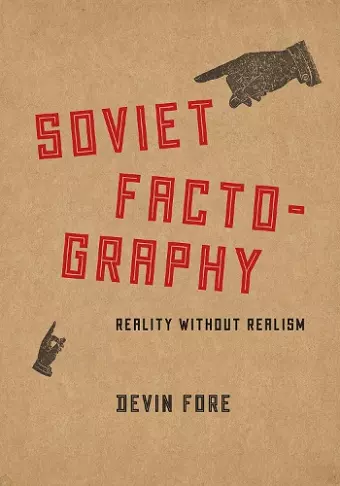Soviet Factography
Reality without Realism
Format:Hardback
Publisher:The University of Chicago Press
Published:1st Oct '24
Should be back in stock very soon

A study of Soviet factography, an avant-garde movement that employed photography, film, journalism, and mass media technologies.
This is the first major English-language study of factography, an avant-garde movement of 1920s modernism. Devin Fore charts this style through the work of its key figures, illuminating factography’s position in the material culture of the early Soviet period and situating it as a precursor to the genre of documentary that arose in the 1930s. Factographers employed photography and film practices in their campaign to inscribe facts and to chronicle modernization as it transformed human experience and society. Fore considers factography in light of the period’s explosion of new media technologies—including radio broadcasting, sound in film, and photo-media innovations—that allowed the press to transform culture on a massive scale.
This theoretically driven study uses material from Moscow archives and little-known sources to highlight factography as distinct from documentary and Socialist Realism and to establish it as one of the major twentieth-century avant-garde forms. Fore covers works of photography, film, literature, and journalism together in his considerations of Soviet culture, the interwar avant-gardes, aesthetics, and the theory of documentary.
"[Fore reveals] a fascinating array of original strategies to record a world turned upside down. We follow all manner of 'factographic' authors and artists (writer Sergei Tret’iakov and filmmaker Dziga Vertov are only the best known) as they scramble to register the revolution as immediately as possible. . . . This riveting study of 'reality in revolution' pressures our understanding of both terms; it also shows us how a reordering of any society involves a refashioning of its individuals. . . . Fore thus reclaims a lost period of tremendous innovation, which renders Soviet Factography an important intervention in our own present as well: Its recovery of documentary practices counts as an indirect riposte to the purveyors of disinformation today." -- Hal Foster * Chronicle of Higher Education, on "The Best Scholarly Books of 2024" *
"In Soviet Factography Fore explores this tumultuous era via factography, an avant-garde practice that peaked during the Cultural Revolution (1928–31) and drew on the new mass media of photography, film and radio in an attempt to chronicle Soviet life in real time. . . . Fore tackles this unwieldy subject via scrupulous archival work and judicious comparisons with modernist experiments elsewhere—notably Weimar Germany, his other area of expertise. He is fluent in political and aesthetic theory, and the book hums with offhand references to figures such as Immanuel Kant, Karl Marx and Michel Foucault." * Times Literary Supplement *
“What does revolution require of writers, artists, photographers, and filmmakers? With extraordinary archival diligence and theoretical intelligence, Fore recovers a fascinating array of nearly lost experiments that address this question more radically than ever before or since. Revealed here are unprecedented strategies to document the factuality of a transformed world as immediately as possible––to document it without arresting it but, on the contrary, by dynamizing it anew. This study of ‘reality in revolution’ in the Soviet Union is the perfect complement to Fore’s equally masterful survey of ‘realism after modernism’ in Germany during the same period. It is also, tacitly, a powerful riposte to the purveyors of deceit and disinformation in our own time.” -- Hal Foster, Princeton University
“Remarkable. Through an intricately woven combination of intellectual history and theoretical analysis, Fore presents Soviet factography as a daring experiment in capturing the experience of revolutionary time. A work of sophisticated argumentation that combines deep research with intellectual breadth, theoretical dexterity, and a lively style, Soviet Factography will be required reading for anyone concerned with early Soviet culture, European modernism, Marxist and materialist aesthetics, and the theory of documentary.” -- Edward Tyerman, University of California, Berkeley
“Has there ever been such an efflorescence of artistic and technical experimentation as in the Soviet years surrounding 1930? This brief and shining moment, in which everything seemed possible, has found its interpreter in Fore. Those wanting to understand, and maybe break, the fact-morphing media worlds we inhabit today will find both congenial ancestors and a brilliant guide here to think with.” -- John Durham Peters, Yale University
“This is a rich new history of the Soviet avant-garde’s ‘factographic’ dream. Fore has a rare ability to reveal the life force of ideas in this most utopian of periods. Deftly navigating the complex theoretical milieu of the 1920s, he draws suggestive connections between and across diverse fields, assembling a vibrant cast of characters (Sergei Tret’iakov, Viktor Pertsov, Nikolai Chuzhak, and others), to uncover their shared ambition: to save literature and art—and the world—through the discipline of facts.” -- Emma Widdis, University of Cambridge
“This is a work of profound insight, with astonishing intellectual breadth. Focusing on an exciting but short-lived episode in early Soviet culture, Fore explores the shifting boundary between reality and consciousness, a matter of perpetual concern for philosophers and artists alike. Through their ruthless campaign against the mediations of the artistic image, the factographers made reality more transcendent than ever. Fore’s book opens an exciting chapter in cultural history that helps us understand the great iconoclastic movements of modernity.” -- Boris Gasparov, Columbia University
“Soviet Factography is a brilliant, fascinating, and essential work. Jam-packed with original research and nuggets of insight, it is a monumental achievement and a major intellectual event. Fore brings to life a crucial movement in the 1920s, recreating the excitement and the intense debates among writers, artists, and intellectuals who were engaged in the projecting of building a new communist society. He carefully describes the emergence of factography, in all its political-intellectual-aesthetic inventiveness and urgency. It’s thrilling work.” -- Jonathan Flatley, Wayne State University, author of "Like Andy Warhol"
ISBN: 9780226234861
Dimensions: 254mm x 178mm x 25mm
Weight: 993g
320 pages